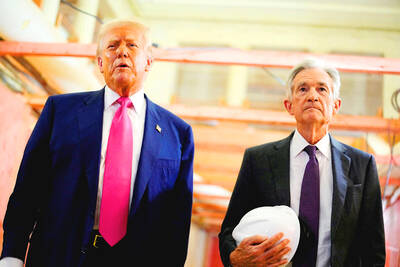China’s manufacturing unexpectedly accelerated last month, indicating a slowdown in economic growth in the first quarter may be stabilizing.
The Purchasing Managers’ Index (PMI) rose to 50.8 from 50.6 in April, the National Bureau of Statistics and China Federation of Logistics and Purchasing said in Beijing yesterday.
That was higher than all estimates in a Bloomberg News survey of 30 analysts and compares with the median projection of 50, which marks the dividing line between expansion and contraction.
Yesterday’s report may provide some comfort to policymakers after the preliminary reading of a private manufacturing survey released on May 23 pointed to the first contraction in seven months.
Chinese Premier Li Keqiang (李克強) said this week that government measures to reform the economy will be accompanied by tapered-off levels of growth and warned last month new stimulus would create risks.
“Given the mixed signals, I’d wait for the full set of activity data such as industrial production and electricity production to judge the momentum of the economy,” said Zhang Zhiwei (張智威), chief China economist at Nomura Holdings Inc in Hong Kong.
“The rise of the official PMI further reduces the chance for monetary policy easing,” Zhang added.
The statistics bureau will release last month’s industrial output, retail sales and inflation data on June 9 along with fixed-asset investment for the first five months of the year.
The customs administration will report last month’s trade data on Saturday.
The preliminary reading of a PMI released by HSBC Holdings PLC and Markit Economics fell to 49.6 last month from 50.4 in April.
The drop, if confirmed by the final figure tomorrow, will be the first reading below 50 since October last year.
The federation and HSBC will also release non-manufacturing surveys for last month next week, providing a fuller picture of an economy that’s becoming increasingly reliant on service industries for growth. Both showed slower expansion in April.
Stocks in China fell 0.7 percent on Friday on concern yesterday’s report would show a decline.
The Shanghai Composite Index rose 0.5 percent for the week and has rebounded 5.8 percent from this year’s low on May 2.
“Markets’ fear of a further growth slowdown will be alleviated and we expect a positive market reaction” on Monday, Lu Ting (陸挺), head of Greater China economics at Bank of America Corp in Hong Kong, said in a note yesterday.
Analysts are paring forecasts for economic growth after expansion unexpectedly eased to 7.7 percent in the first quarter from a year earlier.
The median estimate in a Bloomberg News survey conducted from May 16 to May 21 was for a pace of 7.8 percent in the second quarter, down from a projection of 8 percent in an April survey.

IN THE AIR: While most companies said they were committed to North American operations, some added that production and costs would depend on the outcome of a US trade probe Leading local contract electronics makers Wistron Corp (緯創), Quanta Computer Inc (廣達), Inventec Corp (英業達) and Compal Electronics Inc (仁寶) are to maintain their North American expansion plans, despite Washington’s 20 percent tariff on Taiwanese goods. Wistron said it has long maintained a presence in the US, while distributing production across Taiwan, North America, Southeast Asia and Europe. The company is in talks with customers to align capacity with their site preferences, a company official told the Taipei Times by telephone on Friday. The company is still in talks with clients over who would bear the tariff costs, with the outcome pending further

NEGOTIATIONS: Semiconductors play an outsized role in Taiwan’s industrial and economic development and are a major driver of the Taiwan-US trade imbalance With US President Donald Trump threatening to impose tariffs on semiconductors, Taiwan is expected to face a significant challenge, as information and communications technology (ICT) products account for more than 70 percent of its exports to the US, Chung-Hua Institution for Economic Research (CIER, 中華經濟研究院) president Lien Hsien-ming (連賢明) said on Friday. Compared with other countries, semiconductors play a disproportionately large role in Taiwan’s industrial and economic development, Lien said. As the sixth-largest contributor to the US trade deficit, Taiwan recorded a US$73.9 billion trade surplus with the US last year — up from US$47.8 billion in 2023 — driven by strong

AI: Softbank’s stake increases in Nvidia and TSMC reflect Masayoshi Son’s effort to gain a foothold in key nodes of the AI value chain, from chip design to data infrastructure Softbank Group Corp is building up stakes in Nvidia Corp and Taiwan Semiconductor Manufacturing Co (TSMC, 台積電), the latest reflection of founder Masayoshi Son’s focus on the tools and hardware underpinning artificial intelligence (AI). The Japanese technology investor raised its stake in Nvidia to about US$3 billion by the end of March, up from US$1 billion in the prior quarter, regulatory filings showed. It bought about US$330 million worth of TSMC shares and US$170 million in Oracle Corp, they showed. Softbank’s signature Vision Fund has also monetized almost US$2 billion of public and private assets in the first half of this year,

POWELL SUCCESSOR: US Fed Governor Adriana Kugler’s resignation gives Donald Trump an opening on the board, potentially accelerating his decision on the next chair US President Donald Trump suddenly has a chance to fill an opening at the US Federal Reserve earlier than expected, after Fed Governor Adriana Kugler announced her resignation on Friday. It might also force him to pick the next Fed chair months sooner than he had anticipated. “The ball is now in Trump’s court,” LH Meyer/Monetary Policy Analytics Inc economist Derek Tang said. “Trump is the one who’s been putting pressure on the Fed to do this and that, and Trump says he wants to have his own people on. So now he has the opportunity.” Kugler’s exit unfolds amid unprecedented public pressure